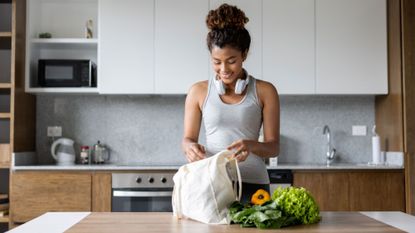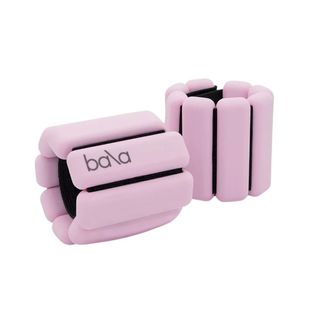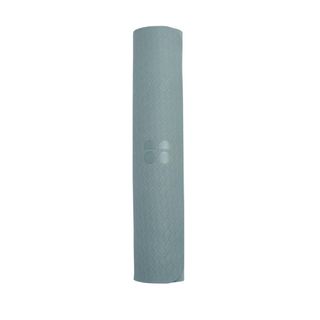Considering trying the 4:3 diet? You'll want to read two nutritionist's opinions on the weight loss plan ASAP
So, does the diet actually work for healthy, sustainable fat loss?

- What is the 4:3 diet?
- How does the 4:3 diet work?
- What do you eat on the 4:3 diet?
- So... should I try the 4:3 diet?
- Would a nutritionist advise you try the 4:3 diet?
- 1. Focus on an achievable calorie deficit
- 2. Try hone in on your snacking
- 3. Move more
- Shop our Health Editor's go-to home workout kit now

It's likely no surprise that, as summer swings around, so too does the barrage of weight loss plans and buzzy celebrity workouts on your social media feeds. This year, it's yet more "what I eat in a day" reels, questionable workout posts, and, of course, the 4:3 diet.
Before we get into the nuances of the diet: you do not need to lose weight for summer. You do not need to lose weight at all, and should never feel pressured to try diet fads or weight loss plans. Most backfire anyway - if you put your body into starvation mode, it'll only cling onto any fat you do have for dear life.
However, if you are keen to lose a little weight, for your health or own personal reasons, that's also totally fine and there are healthy, sustainable, nutritionist-approved ways to do so. So, is the 4:3 diet one those, and would a nutritionist recommend it to their clients?
Good question. On the fasting weight loss plan, you're advised to eat normally for four days and eat 500 calories for the remaining three days of the week. 500 calories a day is very low - the NHS advises women eat 2000 calories a day - so we've spoken to two qualified nutrition experts to see what they think.
If you take one thing from this article, it's that you shouldn't ever feel pressured to lose weight, but if you do want to approach weight loss from a positive headspace and a healthy, sustainable angle, that's totally up to you. Just know you never need to. You are enough as you are.
But if you are keen to read a qualified take from both nutritionist Jenna Hope and nutritional therapist of The Nutri Centre, Katy Mason, keep scrolling.
Your guide to the 4:3 diet: sustainable weight loss plan or diet fad?
What is the 4:3 diet?
The 4:3 diet is a form of intermittent fasting where you significantly reduce your calories to 500 calories per day, three days of the week, Hope explains.
Marie Claire Newsletter
Celebrity news, beauty, fashion advice, and fascinating features, delivered straight to your inbox!
"These days should be alternate days, according to the plan. On the "off" days, you’re encouraged to eat as you would normally," she shares.
How does the 4:3 diet work?
It's kind of similar to the 5:2 diet, where you fast for two non-consecutive days a week - that is, stick to 500 calories and or 600 for men. Then, you eat as you normally would for the other five days.
That said, the 4:3 plan takes it one step further, suggesting that you eat what you want for four days and fast (consuming just 500 calories) for three.
Essentially, it's a kind of intermittent fasting. Fasting has been around since at least the 5th century BC, yet there's division in the nutrition world as to its pros and cons. While lots of research indicates that fasting is good for weight loss and reducing high blood pressure, it can also be incredibly difficult to stick to, anti-social, and trigger disordered eating behaviours, if you have a history of eating disorders.
Other research has also found that fasting is no more effective than other diets, like the Sirtfood diet, Dukan diet and Cambridge diet, for example. Many argue that massively restricting your calories to a quarter of what the NHS recommends you eat, if you can still lose weight more sustainably, just isn't healthy or sensible.
Do note, studies have found that intermittent fasting can be helpful for those suffering from diabetes.

What do you eat on the 4:3 diet?
Individuals on the 4:3 diet are limited to consuming 500 calories per day on their fasting days, explains Hope. "As a result, what you can eat is very restricted. Many individuals consume fluids which contain no calories, black coffees, teas, and lower calorie foods," she shares.
In their book, The Every Other Day Diet, Dr Krista Vardy and Bill Gottlieb give some guidance on how to fast - but do note, this is an extremely low calorie count for anyone, and neither nutritionists questioned would recommend it.
On your fast days, it's suggested that you:
- Eat a 400 calorie meal or two 200 calorie meals, plus a 100 calorie snack
- Drink lots of water
- Drink tea and coffee
- Eat pre-packaged meals with extra vegetables if you are too busy to cook.
On your normal days, it's suggested that you:
- Eat as much as you want - nothing is off-limits
- Don’t feel deprived.
They also advise you to eat high protein foods, high fat foods and limit your sweetener intake, where possible. Not sure how to up your protein? Our guides to the best protein powders and vegan protein sources might help.
So... should I try the 4:3 diet?
There are a lot of problems with this diet, according to Hope.
Why? Well, simply as restricting your calories so much on your fasting days means you may not be consuming enough calories - at all. "The lower calorie intake means there is a real increased risk of nutrient deficiencies," shares Hope.
Plus, eating 500 calories a day is very low, and is likely to be dangerous. You'll almost certainly feel faint or find it hard to concentrate.
It's possible to lose weight while still enjoying your favourite foods, so why cut them all out and risk a disordered relationship with food, the nutritionist ask? "The fasting days do promote significant restriction, which is a high risk factor for a poor relationship with food," Hope explains.

Would a nutritionist advise you try the 4:3 diet?
In short, no. "I definitely would not advise the 4:3 diet as a healthy weight loss tool," shares Hope. "It’s restrictive, reductionist and ignores the importance of consuming a wide variety of foods containing micronutrients and supporting the macronutrient demands required for optimal functioning," she explains.
Plus, she points out, that if you restrict so much three days a week, there's even more chance you'll over-eat on the other four days. Don't do it to yourself - there are healthy, sensible, safe ways you can lose weight, as Hope has highlighted below.
3 tips for losing weight healthily and sustainably
1. Focus on an achievable calorie deficit
Weight loss, ultimately, is about burning more calories than you're eating. Your daily calorie burn is made up of two things - the calories you burn just existing (called your non-exercise activity thermogenesis, or NEAT) and the calories you burn from exercise - think how much your burn doing your favourite free home workout or Joe Wicks YouTube workout.
If you can tot up your daily burn - there are lots of handy apps to help you do this - you can easily achieve weight loss eating around 1400 to 1500 calories a day, which is also enough to make sure you're not deficient in any key minerals or nutrients.
Focus on what you can add into your diet, incorporating more beans, pulses, fruits and vegetables will naturally displace some of the higher sugar, higher fat foods which in turn can help with weight loss. Tips for how to eat the recommended amount of fruit and veg a day, here.
2. Try hone in on your snacking
Often, if you graze on snacks throughout the day, you won't realise quite how many calories you're consuming, share both nutritionists.
"Also try and limit your snacking after dinner, if possible," advises Hope. "Those who snack later in the evening are more likely to opt for higher sugar, higher calorie foods.
Top tip: ensure your dinner is satiating. This will help to reduce evening snacking and in turn prevent overeating," she explains. Our healthy snack ideas might come in handy, too.
3. Move more
Simple, but important. If you're looking to lose weight, moving more daily will only increase how many calories you've burnt in the day. Everything counts - from walking, to skipping, to zumba. The world is your oyster.
Do remember, everyone's weight loss is different. What works for you, might not work for others - and that's ok.
Shop our Health Editor's go-to home workout kit now

If you're a fan of Pilates, yoga, strength training or, well, any home workout really, these handy bangles promise to add a bit of spice to any strength session. They can be used on your wrists or ankles to add resistance and burn.

Ally Head is Marie Claire UK's Senior Health, Sustainability, and Relationships Editor, nine-time marathoner, and Boston Qualifying runner. Day-to-day, she works across site strategy, features, and e-commerce, reporting on the latest health updates, writing the must-read health and wellness content, and rounding up the genuinely sustainable and squat-proof gym leggings worth *adding to basket*. She's won a BSME for her sustainability work, regularly hosts panels and presents for events like the Sustainability Awards, and saw nine million total impressions on the January 2023 Wellness Issue she oversaw. Follow Ally on Instagram for more or get in touch.
-
 Anne Hathaway had to kiss 10 men during a 'gross' chemistry audition early in her career
Anne Hathaway had to kiss 10 men during a 'gross' chemistry audition early in her careerUgh
By Iris Goldsztajn
-
 There was a hidden code in Baby Reindeer that everyone completely missed
There was a hidden code in Baby Reindeer that everyone completely missedDid you spot it?
By Jadie Troy-Pryde
-
 I'm a Health Editor who's tried 100's of shoes - these are officially the best gym trainers you can buy
I'm a Health Editor who's tried 100's of shoes - these are officially the best gym trainers you can buyFor running, weight training, walking, and more.
By Ally Head

